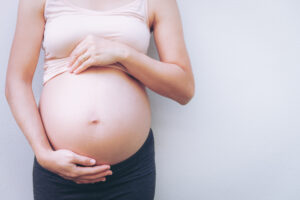Does Male Infertility Begin in the Womb?

A relatively alarming study was published a couple of years ago that suggested that a pregnant woman’s behavior can determine the fertility of her unborn son. Researchers looked at the sperm quality of 387 men and compared the data to the amount of beef their mothers consumed while they were pregnant. They found that the sons of “high beef consumers” (>7 beef meals/week) had sperm counts that were 24% lower than in men whose mothers ate less beef. Interestingly, sperm counts in the sons were not related to their mothers’ consumption of other meat or to the sons’ consumption of meat. This correlation is not much different than the semen quality decrease found in men whose mothers smoked while they were pregnant.
The author of the study theorized that the estrogen content in beef may be responsible for altering testis development in utero, which can adversely affect fertility later.
Sounds almost biblical, doesn’t it? I bring this up because of a point that I made in last week’s blog. In “The Curse of Women’s Urine,” I mentioned how xenoestrogens or environmental estrogens have been found to affect the development of male animal fetuses, resulting in intersex conditions at birth or infertility as adults. Well, as the study of mothers’ beef intake reveals, the same issues may also exist in humans. As Aristotle once said: “At his best, man is the noblest of all animals; separated from law and justice he is the worst.”
Time for a quick lesson in biology: when do testicles develop in humans? Believe it or not, the process begins when a male fetus is just 4 weeks old. Two weeks later, the primitive germ cells (sperm precursor cells) migrate to the urogenital ridge and set up what is to later become the testis. About 1-2 weeks after that, “sex cords” develop in the primitive testis, setting up the architecture of the mature organ. So, by 8-12 weeks of pregnancy, the human testis is virtually a complete organ, holding within it all of the potential it will ever have.
Hence, the “critical window” of exposure for the human testis, that period in which even a potentially small exposure could wreak significant developmental and long-lasting havoc, is about the time when most women start to realize that they are actually pregnant, with signs like morning sickness and pain in the breasts. Obviously, this would make it more difficult for women to deliberately modify their diet at the time it could (potentially) have the most impact.
So, does this mean that male infertility begins in the womb? This topic needs much more examination to say with any certainty, because all studies have flaws. For example, in the study of beef-eating pregnant women, the cohort of sons whose sperm counts were so thoroughly examined were ALL fertile. That’s right, their wives were all pregnant. Oscar Wilde couldn’t have said it better when he said: “The pure and simple truth is rarely pure and never simple.”









